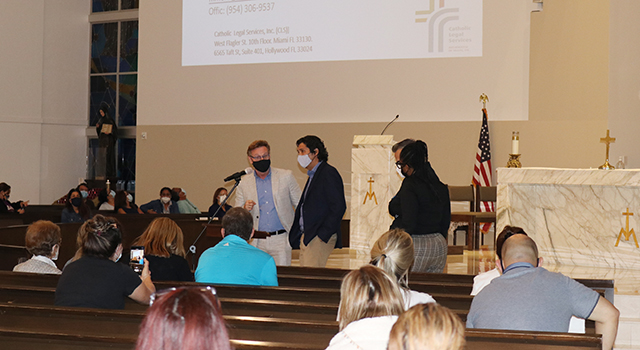By Rocio Granados - La Voz Catolica
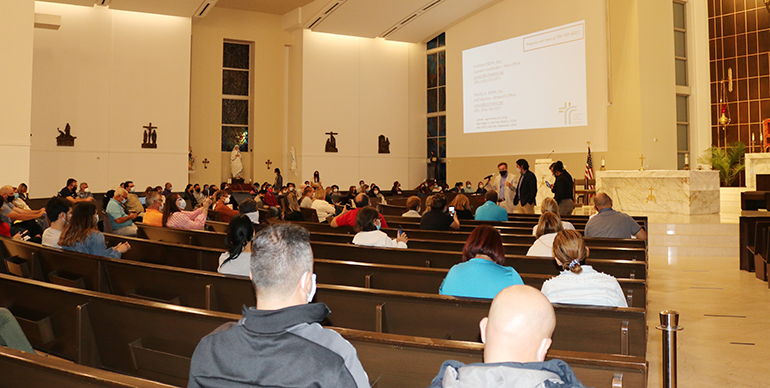
Photographer: ROCIO GRANADOS | LVC
More than 100 Venezuelans attended the Jan. 27, 2021 informational session on Deferred Enforced Departure held at Our Lady of Guadalupe Church in Doral, a community with one of the largest concentrations of Venezuelans in South Florida.
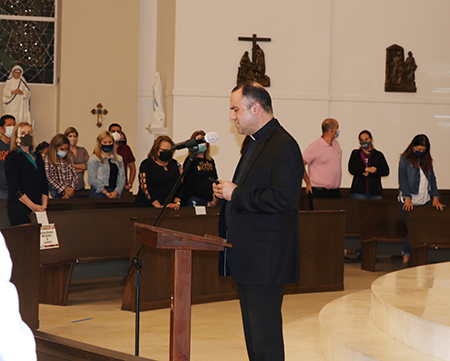
Photographer: ROCIO GRANADOS | LVC
Father Israel Mago, pastor of Our Lady of Guadalupe Church in Doral, prays with parishioners at the start of the informational session on Deferred Enforced Departure for Certain Venezuelans, which took place Jan. 27, 2021.
DORAL | On his last night in office, former President Donald Trump signed an executive order of Deferred Enforced Departure for Certain Venezuelans. A week later, attorneys from Catholic Legal Services of the Archdiocese of Miami told members of the local Venezuelan community not to do anything just yet, since the full scope of the executive order has yet to be determined.
"Lawyers from Legal Services have come to explain in detail what these new measures are about so that they do not fall victim to unscrupulous people who want to charge for things that are not necessary," said Father Israel Mago, pastor of Our Lady of Guadalupe in Doral, where a large community of Venezuelans is concentrated in South Florida.
More than 100 people attended the session, which took place Jan. 27, 2021. A similar session took place Feb. 2, 2021 at St. Katharine Drexel Church in Weston, an area which is also home to many Venezuelans.
The Deferral of Enforced Departure "is a measure to defer for 18 months, with certain exceptions, the removal of any Venezuelan citizen who has habitually resided in Venezuela and who is in the United States as of January 20, 2021," said Miguel Mora, an attorney with Catholic Legal Services.
"This has been an important step in the migratory life of Venezuelans. Almost 200,000 Venezuelans could benefit from this protection," he added.
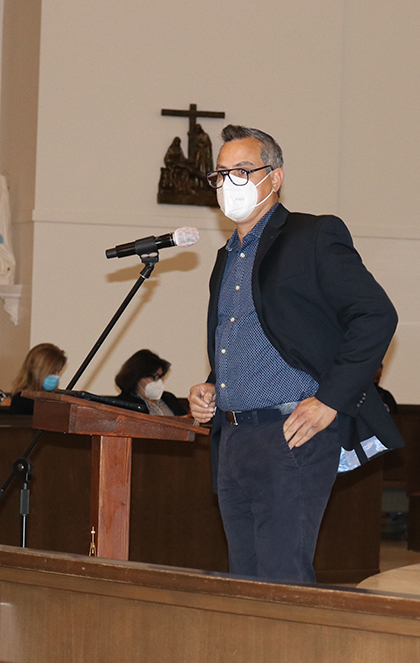
Photographer: ROCIO GRANADOS | LVC
Lawyer Miguel Mora of Catholic Legal Services explains the workings of Deferred Enforced Departure (DED) to Venezuelans gathered at Our Lady of Guadalupe Church in Doral, Jan. 27, 2021.
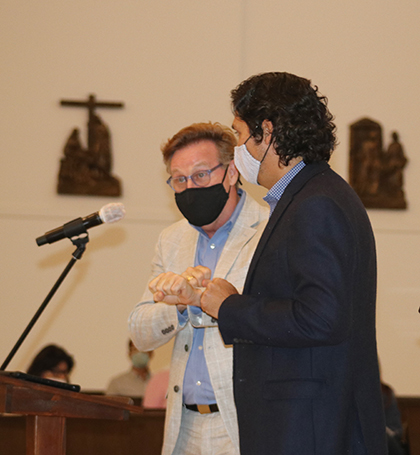
Photographer: ROCIO GRANADOS | LVC
Lawyers for Catholic Legal Services lead an informational session at Our Lady of Guadalupe Church in Doral for Venezuelans interested in finding out about former President Donald Trump's last minute executive order on Deferred Enforced Departure for Certain Venezuelan Nationals.
But there is not enough information on the scope the order will have, nor on the eligibility requirements or how to apply for it, the lawyers said. What is known is that it is a temporary protection for Venezuelan citizens "because of the situation that Venezuela is going through, and does not give them a legal status to stay in the United States permanently," said Randolph McGrorty, executive director of Catholic Legal Services.
Nevertheless, the deferred deportation guarantees eligible Venezuelans will not be deported and will get a work permit. This protection can be extended for several years and may be the pathway to other immigration benefits.
NEED TO WAIT
The attorneys stressed that the community should be cautious. "Do not pay for any help with respect to this deferral because applications have not yet begun to be accepted," warned Mora. "There is still no processing, these measures do not go into effect yet."
People need to wait until the rule is published in the Federal Register and the Department of Homeland Security provides guidance. That would now fall to the Biden Administration, which has yet to make any comment.
What people can do is begin gathering the documents that prove their habitual residence in Venezuela and their presence in the United States as of January 20, 2021. These may include a birth certificate, identity card, passport, habitual residence, proof of entry to the United States and proof of stay, among others.
Deferred deportation does not apply to those Venezuelan nationals who are subject to extradition, or who have already been deported, excluded or physically removed. Those with pending deportation orders are eligible.
Those who have voluntarily returned to Venezuela; those who have been convicted of an aggravated felony or two or more misdemeanors committed in the United States, or who pose a danger to national security; and those who have not continuously resided in the United States as of Jan. 20, 2021 are not eligible.
During the briefing, attorneys answered questions from the audience via text message.
"We have received very specific questions about this protection that we cannot answer now because there is nothing in place at this time,” McGrorty said. “As soon as we have instructions we will go back and make appointments to answer your questions one by one."
Edgar Simón Rodríguez, a Venezuelan immigrant who heard about the briefing through a WhatsApp group, has a pending asylum petition. During the briefing he heard that he can also apply for DED, "although those of us with pending asylum don't have a deportation order," Rodriguez said.
If his asylum request is denied, applying for DED provides "a fallback scenario in case there is a possible deportation," he said, although it would only cover him for 18 months. "It remains to be seen if they extend the measure again for another time."
For the time being, Rodriguez has not made the decision to apply for DED. "I prefer to wait for instructions from the appropriate departments to have a clearer picture," he said.
Rodriguez arrived in Miami four years ago to escape the dire political and social crisis in Venezuela.
"It is difficult to describe in a few words the awful things that are happening in Venezuela. There is torture, people are starving, they are leaving on foot to neighboring countries, exposing their lives. People have no medicine, they have no work, those who are economically well off are a minority," he added.
There is no exact number of how many Venezuelans reside in the United States. In order to reach more of them, the Venezuelan Embassy in Washington D.C., installed by the interim president of Venezuela, Juan Guaidó, is conducting a census of possible beneficiaries of DED and a possible Temporary Protected Status (TPS).
TO LEARN MORE
To contact the attorneys at Catholic Legal Services of the Archdiocese of Miami, visit www.cclsmiami.org.
